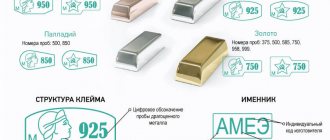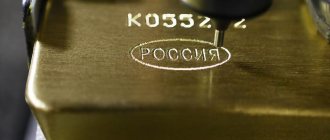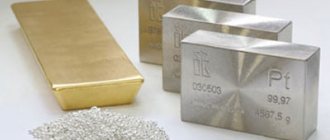05.06.2019
Only an experienced specialist can correctly assess the authenticity and quality of precious material. As a rule, every branch of a pawnshop that you can find in the city has such an employee. Using special equipment, an appraiser can quickly determine the type of metal, its fineness, as well as the type of insert and whether it is precious, if the product contains them.
When assessing gold jewelry, a specialist pays attention to the following criteria:
- Appearance of the product for nuances, chips, damage;
- A sample of the precious metal, even if it is missing or worn off;
- Presence of inserts made of precious stones;
- Weight of the product and insert, if any.
Almost all pawn shops provide free appraisals for jewelry. If the offered amount does not suit you, you can simply take the jewelry you brought and leave.
What kind of jewelry is accepted
Pawn shops accept almost any gold jewelry. In particular, these are:
- Rings and earrings;
- Bracelets and chains;
- Pendants, pendants and medallions.
At the same time, the presence of precious stone inserts is taken into account. Such jewelry also undergoes careful control for:
- Type of stone;
- Forms of its cutting;
- Cleanliness of the insert;
- Weights in carats.
In some pawn shops, the stone is not taken into account, but only the total weight of the product is taken into account. If you want to get the largest possible loan, contact pawn shops where stones are valued separately.
Scrap gold: what is it and what are the features of its implementation?
Pawn shops accept precious metal in the form of jewelry and scrap. In the latter case, it will not be possible to pawn the jewelry at a high price: the price of scrap precious metals is significantly lower. The concept of “scrap” includes deformed, broken or oxidized jewelry that has lost its appearance. Having found out how much scrap gold costs in a collateral organization, you can further study the offers in the purchase or contact private jewelers. The latter often offer a higher price (or purchase a new product in return), since the metal purchased at the price of scrap gold is profitably melted down into expensive designer jewelry.
The price of scrap gold in competing organizations can vary significantly, and not all pawn shops will take the cheap alloy as collateral. The common 375 gold standard indicates a high content of copper and silver, which increases strength, but reduces the consumer qualities of the product: the shine is quickly lost and oxidation occurs. The share of valuable metal in the alloy increases the final cost: naturally, I will sell scrap gold of the highest standard more expensive than “Turkish” gold. However, the most popular in purchases and pawnshops is 585 sample, as the optimal combination of quality and aesthetic characteristics.
What items are not accepted at pawn shops?
The list of gold products that pawn shops do not accept as collateral includes:
- Orders and medals;
- Nuggets and ingots;
- Gold waste and semi-finished products;
- Gold leaf.
How much can you get per gram of gold?
Initially, the price per gram of gold is not taken out of thin air by the pawnshop. First of all, the appraiser focuses on the Central Bank rates. Thus, for 1 g of gold of the most common standard – 585 – pawn shops are ready to offer a loan from 1,480 rubles, and for 999 gold – from 2,500 rubles (at the time of publication). The rule here is simple: the higher the standard, the more expensive the gold jewelry will cost.
How are products with stone evaluated?
Many pawn shops value jewelry with precious inserts based on their total weight. The thing is that there are not so many specialists who can distinguish a genuine piece of jewelry from a fake. Stones are evaluated by gemologists specially trained in this craft, and not every pawnshop is able to employ such a professional.
However, if you go to a pawnshop where gold and diamonds are appraised separately, consider yourself very lucky! This way you can get a larger loan amount secured by the product than if you calculate it in total.
Where are precious stones accepted in Moscow?
Many people invest their money in gemstones because it is practical. But in life the opposite situation may arise, and the jewelry will need to be handed over, then the person asks the question: where is the most profitable place to pawn his jewelry in Moscow?
Pawnshops accept precious stones, but often these organizations take advantage of a person’s predicament and accept jewelry at a very low price.
Jewelry factories or companies directly purchase precious stones. They will be able to sell their jewelry more profitably, for example, diamonds, rubies, opals, sapphires and many other stones. The quality and authenticity of the product will be checked by a professional expert.
By visiting our store, you will receive:
- A qualitative assessment of your jewelry by professional gemologists;
- You will be offered the highest and most favorable price for gems and precious metals;
- The transaction and assessment will have complete anonymity;
- Registration will be carried out in accordance with current legislation.
Our experts will evaluate your jewelry in an average of 15 minutes and offer good money for it; If you are satisfied with everything, the specialist will promptly complete all the necessary documents and immediately pay you the money in cash without deducting a commission.
Why is it profitable to donate stones from jewelry to an antique store?
Our store has quite a wealth of professional experience, because the staff was carefully selected and only the leading experts in the capital work for us. In our store you can always sell precious stones at a profit.
Advantages of cooperation with an antique store:
- We cooperate only within the legal framework;
- We have an online mode of operation for those clients who cannot take the time to come in person. A person just needs to take a few photos and send them to us by email or through a special mobile application, and within 15-20 minutes our specialists will answer you.
- Special customer safety is observed, so money for the product can be received either in person or using the details specified by the owner.
- The antique store will always value the trust of its customers, both regular and new.
- Our store cooperates with many registered collectors, pawn shops and colleagues from abroad, so handing over precious stones will not pose any danger.
Pawn or sell
The question “Pledge or sell” probably came to mind at least once to those who were planning to pledge property to a pawnshop. Most pawnshops today accept gold jewelry exclusively as collateral, however, the client himself can determine the fate of his jewelry by not showing up on time for its redemption. Thus, the sale of gold will take place, and the price for it will be the unpaid amount of the deposit.
Gold purchased from collateral can serve as a safety net for you in times of crisis countless times. Therefore, it will be more profitable to buy the gold back and, if necessary again, pledge it again.
Principles and features of pawnshops
Pledge organizations are focused on making a profit, so you can’t earn much by selling gold to a pawnshop: the prices for gold in any pawnshop and the price offered for the product will be a maximum of half of its real value. In addition, precious and semi-precious stones are not taken into account, so a grandmother's ruby ring will be accepted for the price of scrap gold. The only exception can be a truly exclusive piece of jewelry, the market value of which is much higher than the nominal value. Having found out how much 1 gram of gold costs and leaving a family heirloom of undoubted historical value as collateral, it is worth spending some time and going to several pawn shops to find the best offer.
When completing a transaction with a collateral organization, an agreement is concluded where all the conditions must be specified. The main points of the agreement guarantee the safety of the transaction for both parties and include:
- pawnshop details (there may be actual and legal addresses);
- passport information about the borrower;
- name of the pledged product with a full description of its features and characteristics;
- estimated value of the decoration;
- the amount of the loan provided and its term;
- fixed interest rate;
- clarification of the possibility and conditions of early repayment;
- a clause on the client’s right to receive the difference in value when selling the pledged item.
If the product is not purchased by the client within the time period specified in the contract, the pawnshop cannot sell the product for another month. After this time, the jewelry is put up for sale. If the proceeds are less than the estimated value, the organization does not have the right to demand additional payment from the owner: errors in determining the cost of gold per gram and the work of the appraiser are the problems of the organization itself.
Features of receiving elite products
If you are going to pledge expensive diamond jewelry and expect to receive an adequate amount for it, you should not contact the first establishment you come across. Take care in advance to search for specialized institutions that accept elite jewelry, because there are not many such organizations. When evaluating such products, the following are taken into account:
- Size and weight of the stone;
- Its color, purity and quality;
- Elite brand;
- The aesthetic value of a product, especially if it has an original design or is an antique.
A standard pawn shop will simply offer you an amount of money based on the total weight of the jewelry.
What happens if you don't repay the debt?
If the borrower does not repay the money, the pawnshop must wait a month before it can sell the pawned item. This period is called grace period and is counted from the first day of delay.
Moreover, the conditions for storing property cannot be worsened. The pawnshop cannot say: “Oh, well, since you don’t pay, I’ll move your car from a warm garage to a damp basement, where rats will eat it.”
At the end of the grace period, the pawnshop sells the property. If its value is more than 30 thousand rubles, the pawnshop must organize an open auction. The auction winner who offers the highest amount takes the item for himself.
If the cost of an item does not exceed 30 thousand, the pawnshop will sell it as it sees fit. He can put it on display or register it in the name of his own employee.
The debtor is liable to the creditor only for the pledged property. In the worst case scenario, he will simply lose it. Even if the money received from the sale does not cover the amount of the debt, the pawnshop cannot demand additional payment.
How to return property that was not purchased on time. As long as the pawnshop has not sold the item, it can be returned at any time. To do this, pay off the debt in full, including interest.
If the property has already found a new owner, then that’s it – the train has sped away. But you can force the pawnshop to share the profits. If the proceeds from the sale exceed the amount owed, the borrower is entitled to receive the difference. To do this, you need to send an application to the pawnshop with a request to calculate the amount to be returned and make a payment. You have 3 years from the date of sale to submit an application. If you miss the deadline, nothing will be returned.
What are the guarantees for the return of valuables?
Today there are not as many unreliable organizations as there were before, but no one is safe from fly-by-night companies where you can bring gold today, but tomorrow you simply won’t find a pawnshop. Therefore, it is recommended to pawn jewelry in a company with many years of experience, which has long occupied its niche in the market. A self-respecting company will treat each visiting client with care, and also take care of its reputation, both in the market and online.
How to check the authenticity of a pawnshop? You can spend 5 extra minutes surfing the Internet, reading reviews about the chosen company, or blog posts/on social networks. If pawnshop employees provide feedback to their clients for several years in a row, you don’t have to worry: this is a reliable organization.
You can also require the pawnshop employees to provide a Certificate, which also indicates the long-term and legal existence of the pawnshop, as well as guarantees of the return of your personal valuables.
Who can pawn things
The pawnshop accepts items from owners or their representatives by proxy. But it is not always possible to identify the owner - in the case of a car, it is enough to check the documents, but on a TV or jewelry it is not written who they belong to.
This is used by thieves who are trying to quickly sell their loot. Therefore, from time to time, police officers visit the pawnshop and seize stolen items. Then the pawnshop may demand that the borrower repay the debt, but the chances that the criminal will repent and bring the money are zero.
At what age can you take things to a pawnshop? Only a legally capable citizen can be a borrower. Legal capacity begins at the age of 18, but there are exceptions:
- A person got married before reaching adulthood.
- There is written consent from the parents, adoptive parent or trustee to complete the transaction.
- The minor turned 16 years old and was emancipated - officially declared legally competent.
This is according to the law, but in practice the creditor will not deal with emancipations and permits, but will simply refuse to give the minor money. The operating rules of many pawnshops indicate an age limit: only from 18 years old.
conclusions
Lately, pawnshops have significantly improved the level of their service. Some of them are already competing with the banking service sector and microfinance companies.
Their activities are closely monitored by government control services, so it has become much more difficult to be deceived, which is another plus for the borrower.
To successfully work with a pawnshop, you should always soberly assess your capabilities and understand the principles of operation of such organizations. Taking into account all these subtleties, any person will solve his temporary financial difficulties with the help of a pawnshop.
Cars
Do you want to get a loan secured by a car? The procedure for registering a pledge is the same as for gold or equipment. An experienced appraiser inspects the car, checks the documents and issues a lien ticket. Your vehicle will remain parked until interest and principal are paid.
Requirements for pledging a car:
- the car is not seriously damaged;
- no encumbrance on the car;
- the owner applied for the loan;
- car equipment saved
- PTS and vehicle registration certificate were provided.
There are cases when owners are not ready to leave the car as collateral. For example, this machine is used in business and if it is idle, the entrepreneur will not make a profit. Then you can choose the option of receiving money secured by PTS. The procedure for obtaining a loan is the same as for collateralizing a car.
Reception of household and digital equipment
Since the cost of assessing digital equipment depends on the kit provided, it is better to bring the device in the original box, with warranty cards and all accessories. If this is not possible, then the minimum requirements are the availability of charging for phones and tablets, and remote controls for TVs.
Digital equipment must be undamaged and function properly. To be able to correctly and fully check the device, take care to charge the battery and remove passwords once they are installed on the device. Another requirement for the proposed collateral is its relevance. Items older than 5 years are not accepted by the pawnshop.
Household appliances must be new and have a complete set.
Redemption rules
The client can redeem the item at any time. You need to pay the amount received and interest for the past period. You can return the money immediately or in installments. The terms for the redemption of the collateral property are specified in the contract. If the loan term ends and there is no way to return the full amount, you can pay interest and extend the collateral agreement.
Do not despair if the terms of the property redemption are missed. In most cases, pawnshop clients receive an additional grace month for redemption or interest payments.
How to avoid encountering scammers
The Central Bank strictly controls pawn shops, fines and issues orders. There are a lot of restrictions: insure your property, don’t sell it while the grace period is running, don’t increase the interest rate. Therefore, many pawnshops prefer to work in vain, pretending to be consignment stores.
But a thrift store cannot issue loans secured by property. Therefore, cunning people have to disguise such transactions. There are two popular schemes: a purchase and sale agreement with the right to repurchase and a commission agreement.
Purchase and sale agreement with repurchase. According to the documents, the borrower sells the property to the store, but can buy it back before the end of the specified period. The difference between the sale and redemption amount is the hidden interest on the loan.
Commission agreement. The borrower, as it were, hands over his item to the store and instructs him to sell it. The store immediately gives him an advance for the sale - this is a disguised loan amount. Then the borrower changes his mind about selling, returns the advance and terminates the commission agreement. But there is a penalty for early termination - this is interest on the loan.
Here the borrower signed the purchase and sale agreement. He has not yet gone into default, but has already given away the rights to the property. Or he entered into a commission agreement - asked to sell some thing. When the borrower comes to buy it, it may turn out that the item has actually been sold. And he will still be in debt for such a “service.”
What's wrong:
- The Central Bank does not control interest on such gray transactions. They are limited only by the greed of the illegal pawnshop.
- The property is not insured.
- There is no grace period.
- It is impossible to recover the difference between the amount owed and the sale price.
- The property may not be returned, even if the money is paid on time.
This is what happens when you confuse a pawn shop with a consignment store.
Fedor handed over his Canon camera and received 3,500 rubles, as he thought, as a loan. Fedor was a little late with the payment, but hoped that nothing would happen. He knew that no one would touch his camera during the grace period.
But Fedor did not take into account that it was not a pawnshop, but a consignment store. And he signed an agreement not for a loan, but for a commission. The store fulfilled its obligations in good faith and sold the Canon to Sergei for 3,500 rubles. After the purchase, the new owner put Canon up for sale through the same store, but for 8,500 rubles.
When Fedor came to buy the camera, he was told that the product had been sold. Summary of the story: Fedor buys the camera from Sergei for 8,500 rubles and goes to court to recover the difference and moral damages. But the court refuses - everything is according to the law. He himself ordered the sale of Canon, so they sold it. And the fact that Fedor thought it was a pawnshop is his fantasies and problems.
To avoid falling into the clutches of scammers, remember a simple principle: when applying for a loan, a pawnshop must issue a pledge ticket and a loan agreement. If they issue any other documents, it means that this is not a pawnshop, and your property is in danger.
I took out a loan from an illegal pawnshop that operates under the guise of a thrift store. According to the documents, they prepared it as if I had put the ring up for sale under a commission agreement. The stunt was performed by professional stuntmen, do not repeat it at home - you may lose the pawned item.











